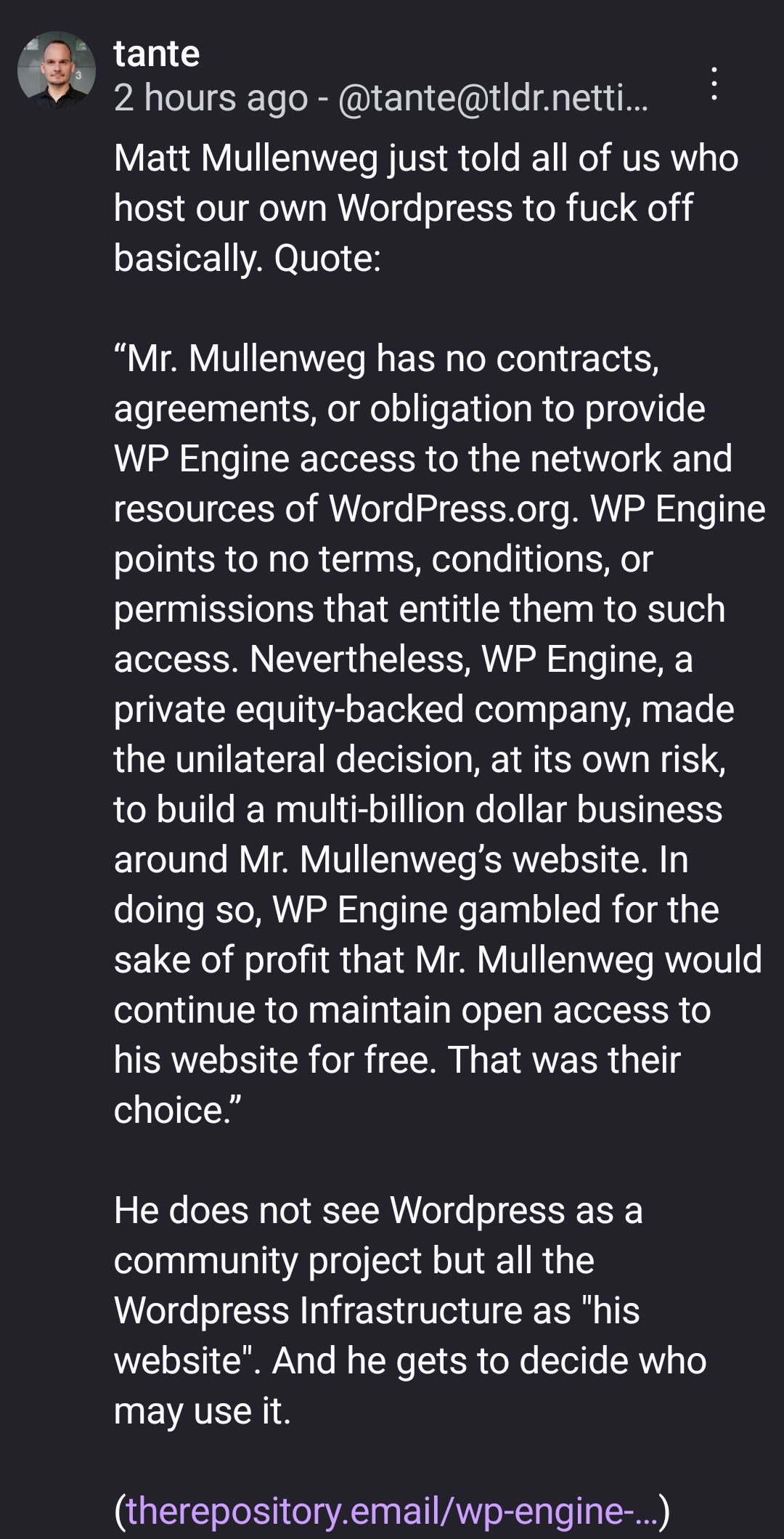this post was submitted on 24 Oct 2024
245 points (95.9% liked)
People Twitter
8364 readers
2150 users here now
People tweeting stuff. We allow tweets from anyone.
RULES:
- Mark NSFW content.
- No doxxing people.
- Must be a pic of the tweet or similar. No direct links to the tweet.
- No bullying or international politcs
- Be excellent to each other.
- Provide an archived link to the tweet (or similar) being shown if it's a major figure or a politician. Archive.is the best way.
founded 2 years ago
MODERATORS
you are viewing a single comment's thread
view the rest of the comments
view the rest of the comments

Can someone explain what this means? Isnt the whole wordpress stack open source? What relevance does this guy have?
Have the same question. It seems to be open source but if they wanted to they could make it closed source for sure..
They cannot make WordPress closed source because it’s released under the GPL, which means that any closed implementation cannot use this code.
With that said, the linked article is about access to wordpress.org, which is different from the source code of the project. I’m not entirely sure what this is about.
They can, but only if all contributors agree or their work is removed entirely, and only future releases (code released prior to that is still GPL).
It's like Nestle taking water and selling it for profit. Except, this watering hole was built and maintained by everyone. Now, we all have to do more work to build and maintain, so Nestle can take more water. Matt, the guy who kinda invited everyone to the watering hole, is like "they gotta help maintain this watering hole, obviously!"
This is basically about the infrastructure for plugin update checks and similar centralized services.
I don't know what the governance setup is like, but in theory the owners of the project can change the license to whatever they like at any time.
The catch is that this doesn't affect old versions, which remain available under the old license. So they could make WP closed-source or make the license more restrictive, but WP-engine or any portion of the community could make a fork and maintain the open source version from there. It wouldn't have the features added by the mainline WP project since the license change (and they'd likely have to change the branding), but that's about all that would be lost.
Similar things have happened in the past: see OpenOffice becoming LibreOffice for example.
Nope. This is GPL. To change the license they would need entirely new code.
Nah wordpress would instantly die if it went closed source. So many businesses only function the way they do because wordpress is easily customizable.
It would just get forked by some big webhosting company.
Imo, the problem is that wpengine is a direct competitor to mullenberg's own commercial exploitation of the open source stack WordPress. He also owns automattic, which offers WordPress hosting, just like wpengine. If you ask me, the owner of the open source stack shouldn't also be able to dictate which other companies make money of it, when he does this himself with automattic, aka WordPress.com.
Then again I'm only involved through my profession. Privately I enjoy ghost.org.
Thanks for the downvote matt
Do you know about how Android is open source, but Google has moved a bunch of important functionality to Google Services which makes Android less desirable without them?
From my understanding it's not nearly as bad as that with WordPress, but similar in that some functionality relies on non-open source stuff that this guy Matt and his company automatic control.
He's mad that competitor company WP Engine doesn't contribute back to the project, so he's making a lot of noise and making moves to limit their access.
The comparison with Android and Google, I'd argue it's worse on android.
You can absolutely host your own open-source WordPress, and get plugins and core features using a mirrored server. It's a bit harder, but if you're anti-Matt, then you're technically competent already to do this. And the experience is pretty straightforward.
For Android development, many features that are really nice-to-haves require Google services. Yes, there are workarounds. But it's reinventing the wheel, creating your own systems, and can be a inconsistent experience for users.
Btw, I'm on the "Fuck Matt" train, because as a open-source contributors, he's making devs lives harder with his meltdown. But I also giving double middle fingers to WP Engine.
There's a strong current of people who believe the WP fight with WPEngine is bad on this guy's behalf. He's megalomaniacal, he's being a spoiled rich guy, stuff like that.
Personally I don't see it, but I may not know enough about it. But I see this as a part of that conversation. Someone's arguing that fighting with a private corporate business whose model depends on exploiting the software they have no intention of supporting is outrageous and he's Gone Too Far.
Matt has muddled the waters on open-source.
He owns a for-profit company, and has a lot of power on the non-profit open-source version. And he's making decisions that affect both.
Open-source contributors who only want to help the nonprofit are now being forced to opting in/agreeing to be part of the lawsuit. Everything in the WP slack where volunteers participate is now part of legal evidence.
All of this only benefits Matt.
1/10th of his company resigned. Volunteers are pulled in and having to decide if contributing to open-source is worth all of this.